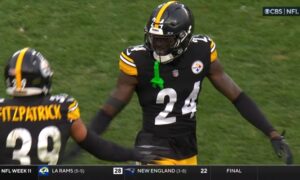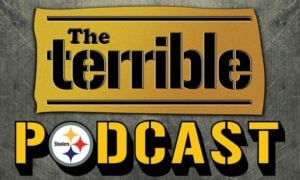Player: G Isaac Seumalo
Stock Value: Up
Reasoning: Isaac Seumalo will be the old head of the Steelers’ offensive line by next season. That’s what it sounds like, anyway, with James Daniels suggesting the team doesn’t plan to re-sign him. And with Daniels potentially leaving, that leaves an open guard spot for one of the younger players to fill. And that’s one less challenger for his job. Oh, and he showed last season he can still play at a high level and stay relatively healthy.
The Pittsburgh Steelers have been turning over their offensive line room for the past four years. They are hoping they are drawing to a close in the near future though, after drafting three linemen. All three them could potentially start by 2025, with Isaac Seumalo and Broderick Jones as 2023 additions.
Of course, Jones was a first-round rookie in 2023, whereas Seumalo was a 29-year-old free agent signing. But he established himself as the Steelers’ best and most consistent offensive lineman during the year. While he didn’t play at a Pro Bowl level, his only real blemish was missing some time due to injury.
Considering his track record with injuries, though, Seumalo’s minor ailments last year were a breath of fresh air. Realistically, he could have at least a few good years left in him and play well into his 30s. Ramon Foster played through his age-33 season, as one recent Steelers example.
The other factor is James Daniels, who reportedly said the Steelers won’t sign him to an extension. Daniels should make good money as a free agent, but that means an open starting job. The front office has to worry about filling that impending hole while leaving Isaac Seumalo where he is.
That is why they drafted Mason McCormick. It is why they moved Spencer Anderson to guard this offseason and hold Nate Herbig in their back pocket. They have options, but at best, likely one will pan out. And because of Seumalo, they only need one.
As the season progresses, Steelers players’ stocks rise and fall. The nature of the evaluation differs with the time of year, with in-season considerations being more often short-term. Considerations in the offseason often have broader implications, particularly when players lose their jobs, or the team signs someone. This time of year is full of transactions, whether minor or major.
A bad game, a new contract, an injury, a promotion—any number of things affect a player’s value. Think of it as a stock on the market, based on speculation. You’ll feel better about a player after a good game, or worse after a bad one. Some stock updates are minor, while others are likely to be quite drastic, so bear in mind the degree. I’ll do my best to explain the nature of that in the reasoning section of each column.








